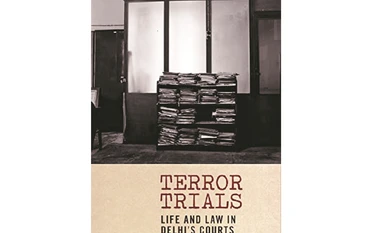Terror Trials: Life and Law in Delhi’s Courts
Author: Mayur R Suresh
Publisher: Orient Blackswan
Pages: 255
Price: Rs 1,135
“Law” exists on so many different planes that necessarily intersect with each other — there is law as a moral force; law as a philosophical construct with its myriad theories; law as it ought to be when the legislating body debates on how to formulate the words of the law; law as it is eventually formulated and enacted by a legislating body, which is the law we, as ordinary citizens, recognise as “the law”.
And then there is law as it is actually implemented in the court, with all its technicalities and the words with all their nuances and myriad interpretations that keep lawyers occupied, and, of course, the actual people on all sides, with their attendant human foibles and quirks.
Mayur R Suresh delves into a study of how the terror accused, the justice delivery system and law interact in a terror trial. The protagonists of the book are all people who are accused of various terror crimes, whose trials took place in Delhi, and whose engagement with the law and the keepers of the law, impacts upon them personally at multiple levels.
The book takes us through a journey to show how the trials of persons accused of committing terrorism are conducted in the courts of Delhi. As he points out, “…from the moment of a suspect’s arrest to the investigative and then the judicial process, the police are the first and the most constant presence for the terror-accused in their entanglement with the law.”
This constant presence, along with terror-accused’s enforced interaction with the technicalities of the law, in terms of legal language, the paperwork, and relationships that are formed, may lead to friendships, sometimes even a “custodial intimacy”, between the accused and the officials of the State, but which can also take on “monstrous forms”. As the author points out “…violence is not in opposition to intimacy, but is a potential part of it…. Intimacy can as readily signal love, friendship and care as it can violence, betrayal and anxiety…”.
What struck me first was the near perfect description of the courts as I have seen them function in Delhi. The book successfully captures the atmosphere in a court premises and the courtroom, and also points out that “terror” trials that find mention in the book, and indeed all such terror trials across the country, are not held in an elevated atmosphere of any special or imposing or majestic court buildings or awe-inspiring courtrooms, but in the everyday confines of the ordinary courtrooms that we see dotted all over the country.
Don’t get me wrong though — this book is not a transcript of trial proceedings, or a description of a courtroom. It is not a second-hand account of a trial, or the autopsy of a trial from the records, but an intimate first-hand account of trials that took place in front of the writer, and in which he played a part. He brings out the trials (apologies for the pun) and tribulations faced by the terror accused, and how in the process of the lengthy period that the terror trials take, sometimes over a decade, the accused themselves are drawn into the technicalities, and words and verbiage of the law, and the impact it has on them.
While much has been written about the inherent unfair nature of the terror laws — Unlawful Activities (Prevention) Act (UAPA) etc — this book does not go deep into the constitutional aspects of these laws, but chooses to examine the manner in which ordinary, everyday human beings are forced to interact with “the law” in order to prove their innocence.
In his conclusion, Mr Suresh points out, while giving the example of a terror accused found “not guilty” after fourteen long years, “…the law is not merely a set of rules or a series of judgments or an expression of state power. It is an effective terrain in which lives are lived.”
Unfortunately, while living that enforced life, there is another life, the everyday life we take for granted, which is almost lost for a terror accused. One such accused, acquitted after having spent over a decade in jail, is quoted as saying, “…when I went to jail there was no internet or mobile phone, all of this is new magic to me…”
If we view all people accused of crimes as a subset of the population of India, those accused of terrorism form an even smaller sub-subset. However, in public perception these “terror” accused are more reviled and hated than “ordinary” accused. The book is certainly worth a read if you want to know how the use of “terror laws”, which are loaded against an accused, almost smothers every aspect of the life of a “terror” accused. Even though the normal rules are “bail not jail”, and “innocent until proven guilty”, these rules are not available to terror accused, and the book explores how, because normal criminal procedure and principles are not available to them, the lives of terror accused are almost entirely consumed with their interactions with the technicalities and language of the law, and their interpersonal interactions with the keepers and enforcers of the law in their effort to prove their innocence.
The reviewer is a lawyer practising in Delhi
Unlock 30+ premium stories daily hand-picked by our editors, across devices on browser and app.
Pick your 5 favourite companies, get a daily email with all news updates on them.
Full access to our intuitive epaper - clip, save, share articles from any device; newspaper archives from 2006.
Preferential invites to Business Standard events.
Curated newsletters on markets, personal finance, policy & politics, start-ups, technology, and more.
)